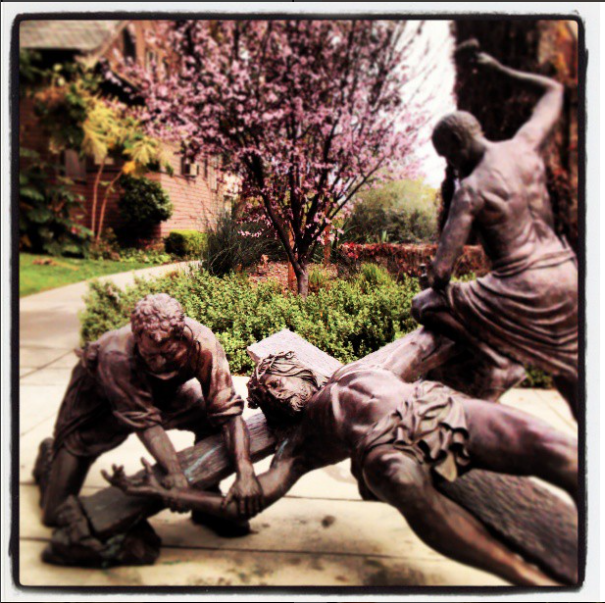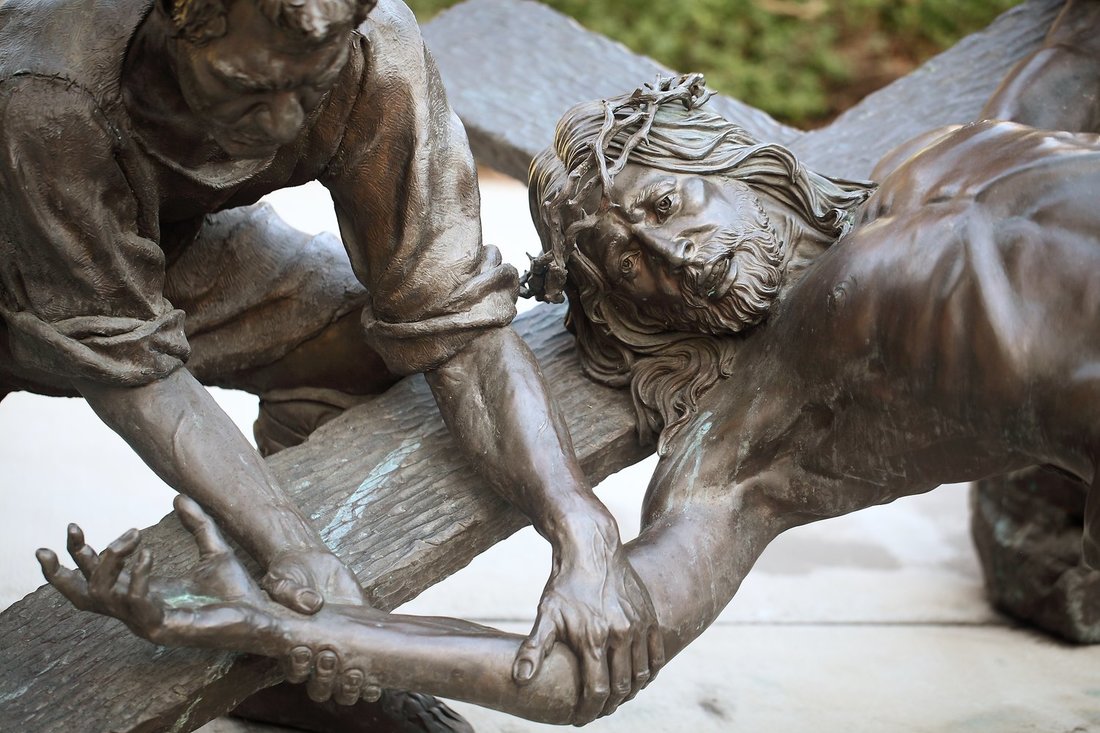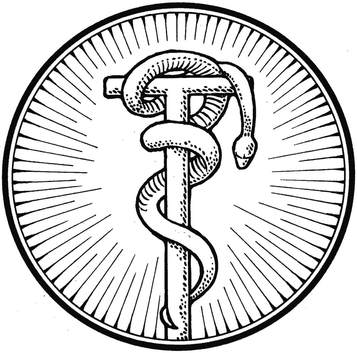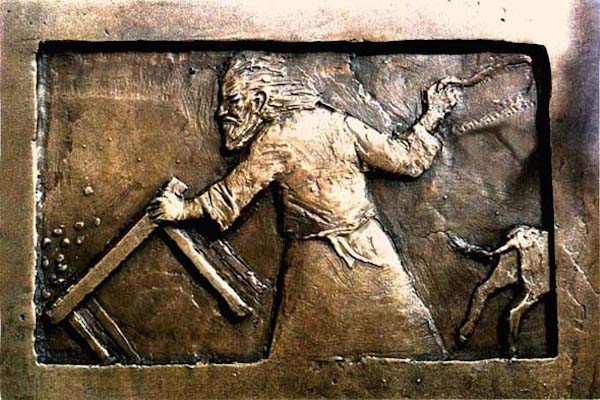Someone once said, “The cross has become so ordinary that we hardly see it anymore.” Let’s think about that for a moment. That’s like saying the noose of the Ku Klux Klan or the gas chambers of Nazi Germany are as noticeable as the dust on our history books. The cross was a serious weapon of war. And I doubt anyone who witnessed a loved one being crucified ever forgot the brutality and pain this innocuous piece of wood represented. That was its point. It was designed to make a lasting impression. The cross of Christ was not ordinary – but extraordinary. I find it hard to believe that we’ve become so jaded that we can no longer see God’s ability to take something so horrific and humiliating, and transform it into something so honorable and liberating. Christopher Slatoff, an artist who has been working on a series of sculptures depicting the Stations of the Cross, wants us to see this iconic weapon for it’s true beauty – God’s redeeming love. While the Stations of the Cross is highly symbolic to the church, Slatoff wanted the public to see the humanity of Jesus, in it’s rawest form, so we wouldn’t forget the divine gift his sacrifice provided. One of his sculptures entitled “Jesus Being Nailed To The Cross” (pictured above) is located on the campus of Fuller Seminary. To stand above it, as the Roman soldiers bang the nails into Jesus’ flesh, you realize this is anything but ordinary. That was his point. I had the privilege to meet Slatoff while I was a student at Fuller. His lecture on this particular sculpture, and all its well-researched details, would change my perspective indefinitely. One of the things that stood out to me was not the agony carved into Jesus’ face or the serious concentration of the two hammer-wielding soldiers who were just doing their job. Instead it was the ordinariness of the wood beams that formed the cross he was being nailed to. They were plain and nondescript – nearly invisible to all the drama that was unfolding. I’m sure most by-standers don’t focus on the wood, muchless what they created – a vile manner of execution that inflicted an anguished death and struck fear into all who witnessed its despicable power. It was by far the greatest weapon Caesar had in its arsenal. Killing one person could silence a thousand more from rebelling against him. Remember the central message of Jesus’ ministry was, “The Kingdom of God is at hand!” Declaring this was dangerous. If God is King over all, then what role does Caesar play? The cross was supposed to silence such nonsense once and for all. But instead it set into motion a plan only God’s creative imagination could execute. This one cross, made up of two ordinary wood beams, held a man whose death was anything but ordinary. While his crucifixion was the world’s way of saying no to everything Jesus stood for, it would come to represent God’s affirming love and redemption for human kind. Those who fixed their eyes upon it and believed would be saved, redeemed, and forgiven. Each time I walked passed Slatoff’s sculpture I found it harder and harder to ignore God’s extraordinary love pouring out from those nail holes; calling out to me “This is my body and blood which is given to you.” It’s impossible to see it as anything less than grace. Jill Carattini writes, “The symbol of the cross is an instrument of death. It is also, curiously, a symbol of God’s kindness. Far from ordinary, it suggests, at the very least, a beautiful and terrible love quite beyond us.” The way I see it, the cross is us. It represents our moral bankruptcy when we are left to our own devices. And the body, broken and bleeding on it, is God’s most vulnerable love and restoration. Jesus’ death is a raw reminder that God’s love can never be silenced, and it can never be killed. In giving himself over completely and willingly to God, as a living sacrifice for us all, Jesus would become triumphant over death. But in order to get there he had to make the painful journey. And so too must we. This is not an ordinary request, is it? But the good news is: God will use whatever means necessary to reclaim us as one of his own. This means God can use a broken marriage to transform a broken heart. God can use the murder of innocent students to bring peace into a violent world. God can take tears of sorrow to bring about shouts of joyous hallelujahs. Those who lined the streets of Jerusalem to welcome Jesus had no idea where his journey was headed. But we do. We know the cross is just a stepping stone to everlasting life. Maybe that’s why it seems ordinary, or why we might over look it. We are no longer shocked or afraid, because we know the tomb will be empty when they roll away the stone on Easter morning. But while we seem know that God can do the most extraordinary things, we still have trouble seeing God at work within ourselves. If God can take two ordinary planks of wood and do the impossible, then imagine what God’s doing right now in you. The place you are standing today is no accident. Every experience you having, is preparing you for the place God wants you to be tomorrow. We do not know which part of our life God will use to accomplish our greatness, all we know is that we must pick up our cross and make the journey from ordinary to extraordinary. The world may overlook the power of the cross. They might see it as an utterly foolish thing to do, as Paul wrote to the churches in Corinth. But that does not stop God from doing what God wants to do. Like a sculptor to clay, God shapes and molds our sorrow and pain into something more beautiful than we can ever realize. The world can try to strip the cross of it’s meaning, or empty it of its beauty, hope, and depth. But what the Romans and the world would eventually come to discover, the cross couldn’t be emptied of Christ. Even where the cross is obscure, Christ is still near - working within each one of us to redeem all of creation back to where we belong…in the extraordinary love of God. Let us pray: Lord God, we have no problem singing your praises and offering you our joys hallelujahs, but picking up the cross and following in the path of Jesus often seems impossible. Give us your Spirit so that we may remain focus, and always be strengthened to do the impossible. Amen.
0 Comments
“Have mercy on me, O God, |
|||||||||||||||||||||||
| study_guide_2018.03.11.pdf | |
| File Size: | 51 kb |
| File Type: | |
God’s radical presence is among us; bringing about the changes needed for God’s Kingdom to be complete.John 2:13-22 So he made a whip out of cords, and drove all from the temple courts, both sheep and cattle; he scattered the coins of the money changers and overturned their tables. | It’s hard for many people to see Jesus as…well, Jesus. But as all four gospels have recorded, it’s possible for the divine Son of God to act like a son of a human – throwing fits and behaving a bit ungodly. I don’t like Jesus acting like me because I struggle daily to be like him. I need him to be the better one, the more mature and even keel. But guess what? Jesus is like all of us, and that’s a good thing. He understands what it’s like to be human. It can be hard, hurtful, and frustrating. We should celebrate that Jesus has feelings and emotions. And like many of us he has difficulties containing them; especially when life isn’t fair. He is not ashamed or afraid to show his passion for life and justice – the essence of God’s righteousness. So we ought not focus on Jesus being like us. But instead, we should all strive to be human’s like him. With all that’s going on in our world, how might Jesus react in today’s political and religious climate. What he might do if he walked into the U.S. Capital or sat in with the Supreme Court? Would he take a position on gun control if he sat with students and parents who lost their loved ones in Parkland, Columbine, or Sandy Hook? Something tells me if he were here today, there would be a target on his back as big and bold as it was some 2,000 years ago. |
We don’t have to look very far to see how our religious and political laws, or simple everyday life, clash wildly with what God wants from us all. Which is why we need Jesus to come inside and do a little house cleaning.
Uncomfortable as it is, John’s gospel reading is perfect for Lent. This is our time to take inventory and to toss away the stumbling blocks and trash bags we carry, so we can make more room in our lives for God’s love and peace. I believe this is exactly what Jesus is doing at the Temple.
In the midst of the religious and political chaos, Jesus enters the sacred space whose name literally means "The house of many nations.” His restoration project begins in the Court of the Gentiles, an area where the local merchants were allowed to set up shop; selling the sacrifices that God demanded.
This area of the Temple was a dedicated place for non-Jewish people to worship or pray to God. But the animals and sellers have made it impossible for people not only to get in but to also find peace. Think about how we get distracted by Daisy barking! Now add hundreds of mooing cows, bleating sheep and squawking birds!
Jesus sees the barrier that the religious leaders have allowed to be put in place. And naturally he doesn’t like it. So naturally he begins to tear them down. Imagine that, God not liking walls.
Years ago I worked in a record store. As CD’s where becoming popular, my boss, Joe, knew the store needed to be remodel and reconfigured to make room for this new format. Now, we worked with this guy Billy Ropple, who was a big, hulking kid. When Joe asked Billy to take down the back wall, this 6’2” chunk of punk rock muscle and rage happily went to work.
When demoing a wall, most people use crowbars, sledgehammers, drop cloths, and gloves. Not so with Billy. He just threw his body into the wall. With his physical strength alone, he smashed holes in the drywall and ripped out the wood studs like they were matchsticks.
With zero regard to the mess he was making...Billy’s pent up rage exploded like a wrecking ball of aggression. To an outsider, it probably looked like a violent rampage, but for us it was truly exciting to watch. By the end of the week the remodel was complete and we were ready to welcome and embrace the future.
Like Billy Roppel, Jesus’ aggressive action was not hostile or belligerent. It was assertive and energetic. Jesus’ action and reaction to what was going on was a restorative act of passion – the same passion he would use to restore and reclaim us as children of God.
To read Jesus’ actions as being an ungodly temper-tantrum we might miss the point of this story: God’s radical presence is among us; bringing about the changes needed for God’s Kingdom to be complete.
Jesus saw that the Temple needed to be reclaimed for its intended purpose. How can you be a house of many nations, if you refuse people from coming in to worship God?
As far as those in power were concerned, the Temple was fulfilling its function as a place to honor God. I don’t believe they were intentionally disobeying or opposing God. They were only doing what they thought God wanted. I can understand that.
But a closer inspection of the place would reveal that there were many inside the temple who had forgotten its true purpose. Instead of being a “House of Many Nations” the Temple had become tainted with exclusivity and economic exploitation.
Like any lopsided structure, the whole thing was bound to collapse. Jesus’ passionate display of God’s justice was just the tipping point. When they confronted and questioned his authority, Jesus said, “Destroy this temple. And I will build it again in three days.”
To most people it was laughable. But as John noted, it’s only as they look through the lens of his death and resurrection, do the disciples get what Jesus is saying. I wonder if he knew that this statement would be use to justify his crucifixion?
Even as we have the privilege of hindsight, we continue to put up walls to keep people out; some are even decorated with stain-glass.
No matter how hard we try, we all get caught up in the human spaces we construct. Bigotry, jealousy, envy, power, greed invade our physical and spiritual structures gradually and subtly. If we are not careful, if we lose our focus on what God is calling us to do and be, we might find our sacred space full of cattle, sheep, turtledoves and moneychangers.
Lent is a time for us all to look at our spiritual structures and do the necessary repairs and renovations. It’s a time to clean out what we don’t need so we can make room for what God is building in each one of us – a true spiritual Temple with Jesus as the cornerstone.
Lent is a time to look in all the nooks and crannies of your life, and ask God to help you to be more open and accepting of others; to be patient with yourself so you can be kind and gracious to those in need; to be forgiving knowing that you have already been forgiven; and to encourage others to love you by the way you love them.
As the Christ, Jesus replaced all earthly temples once and for all. Jesus has removed the barriers that divide us, and by his love he draws us all together. Through him, we become part of much more inclusive structure built with Divine intentions and specifications.
Yes, Jesus was human like us. But he was also divine. Through him we become a true house of many nations…where all people are welcomed to not only be like his humanity, but to also partake in his everlasting divinity.
| study_guide._2018.03.04.pdf | |
| File Size: | 47 kb |
| File Type: | |
Rev. Ian
has been blogging under the name: Jesus not Jesús: Looking for Christ in the face of strangers. You can read his posts and browse his archives by clicking here.
Sermon Archives
November 2021
October 2021
September 2021
August 2021
July 2021
June 2021
May 2021
April 2021
March 2021
February 2021
January 2021
December 2020
November 2020
October 2020
September 2020
August 2020
July 2020
June 2020
May 2020
April 2020
March 2020
February 2020
January 2020
December 2019
November 2019
October 2019
September 2019
August 2019
July 2019
June 2019
May 2019
April 2019
March 2019
February 2019
January 2019
December 2018
November 2018
October 2018
September 2018
August 2018
July 2018
June 2018
May 2018
April 2018
March 2018
February 2018
January 2018
December 2017
November 2017
October 2017
September 2017
August 2017
July 2017
June 2017
May 2017
April 2017
Sunday at 11:00 a.m.






 RSS Feed
RSS Feed

